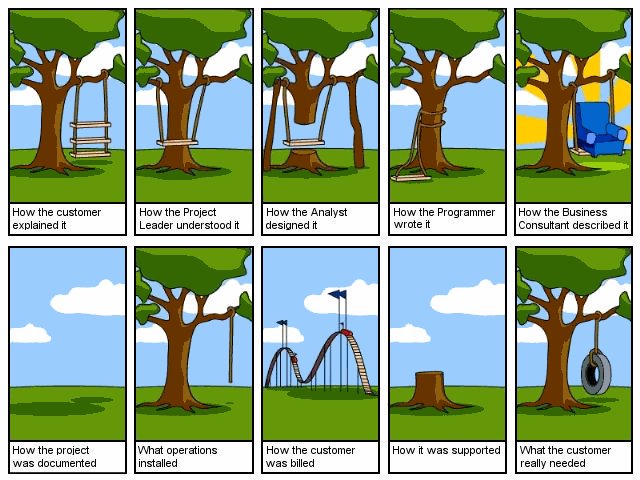Two weeks ago I completed 6 months in Skyscanner and I was thinking of doing a retrospective. There are many topics to cover, such as difficulties, impressions, general thoughts, and lessons. The lessons I learned seemed really interesting, so I thought I'd share them with you. I've learnt many things, some of them tech-related, others more business oriented. In this blog post, I will focus on the most important lessons I learnt being in Skyscanner for the last 6 months as a software engineer.
1. Embracing failures creates intrapreneurs and therefore innovation. 💡
Encouraging creativity, taking risks, trying new things and being open to new ideas are all key attributes to organizational success. So is a willingness to embrace failure. Failure is not necessarily negative. In fact, it is a fundamental component of success. The environment in Skyscanner is really safe to fail, and taking risks and trying things is always supported. You can understand that having such an environment where failures are not punished but embraced, people will experiment, and they will experiment a lot. Experimentation is crucial in any organisation so that they can explore, innovate and be on top of the market among their competitors.
Organizations should strive to move towards a culture in which trust, shared responsibility, safety for failure, innovation, and collaboration are all encouraged — levering Lean and Agile practices as the catalyst to start the cultural change. -- Accelerate.
Being in Skyscanner for half a year, I've seen people creating cool stuff out of experimentation and the support of the company. When you embrace failures, people are more willing to test, investigate, assess and trial and error. People are then acting like intrapreneurs. Intrapreneurs are basically entrepreneurs inside a corporate environment and they are vital components to an organisation if they want to climb the market ladder or stay on top. They are extremely useful because they can find use cases, and products or identify opportunities that nobody would. Engineers in Skyscanner are creating tools or small projects that can uncover business opportunities and eventually be utilised by the company itself in a wider scope. This is amazing to see and experience and although I've seen it in other places, Skyscanner empowers engineers to express their creativity by converting failure from punishment to a lesson.
2. Trust in the employees turns into happier customers 🤝
Skyscanner encourages people to get ownership over a stream of work which is a showcase of trust. By doing that people are more aware and attached to the product and service they are building making engineers more engaged with the organisation and their customers. People are putting more attention and care into their stream of work and this leads to products with higher quality. Therefore our partners and customers tend to be happier. This is a perfect example of the quality of a product reflecting the organisation's culture which is stated in the book Accelerate and this is what is happening with Skyscanner.

I was always satisfied with Skyscanner services as an end user before joining but now that I am part of the team, I can fully understand how the internal company culture had an impact on me as a customer. When you are a user of a service or a product that is buggy, difficult to use, or generally not appealing, then the internal organisation processes are most likely to have the same quality. Skyscanner trusts their engineers and motivates them to take ownership over full work streams which not only tends to give better quality results, it teaches engineers to be more proactive and increases their leadership skills and their willingness to do a good job.
3. Information is flowing fluently when staying close to the customer 😊
Communicating specs with customers or processing feedback is difficult in the software industry. The whole agile movement is pushing us to stay close to the customer and limit the communication barriers, yet in many companies engineers are 3 or 4 steps away from the customer, meaning they have departments or specific people responsible for that communication. Every team in Skyscanner is really close to the customer they are building the service/product for. It might be not direct communication but it's not more than 1 step far away. I know how important is to be close to your customers and communicate with them regularly but now I've also experienced it. Information, feedback, and concerns are flowing fluently between teams and customers which enables us to be more agile and adapt depending on their needs. This also allows us to make higher quality decisions and reverse bad decisions quickly, again being agile.

Every business book that you will read today will advise you to listen to your customers and stay as close as possible, so there is no reason for me to explain in detail why this is important. I can however mention that with us having our customers close in Skyscanner, it enables us to quickly adapt to any customer need and have a more customer-driven approach to our solutions. Without those communication barriers, we are able to have a clear understanding of customer requirements that will end up with better products, happier teams and more satisfied customers.
4. Technical practices are affecting the organisation's performance 🎯
Everything mentioned above is possible because technical practices are put in place that enables the organisation to perform better. Having technical practices like CI/CD, shift security left, and loosely-coupled architecture creates a healthier environment and affects culture. Skyscanner understands that software is the heart of its existence among its people, and has invested a lot in its engineers and its systems.

Provide your employees with control, empower them with a clear vision and goal, provide an environment that encourages experimentation > and learning, create diversity in teams, and connect them with the products and customers they are building — and they will develop a strong sense of identity, and in turn, software delivery performance.
Rolling back a deployment in seconds, receiving alerts from systems that might fail, automate anything possible, are some of the practices that improve the engineer's life quality reducing the chances of burnout and anxiety. Technical practices are vital for any software organisation, not optional, not secondary.
Wrap up
Culture is essential for an organisation's success. You can’t “implement” culture change. Implementation thinking is, by its very nature, counter to the essence of generative culture and generative culture starts with demonstrating new behaviours. Culture is all about the people and an established good one will eventually drive better organisational performance. The lessons I learnt that were really interesting to me are more organisational-oriented strategies and I feel there is more to uncover so I might update you in my next retrospective.
Subscribe to my newsletter
An irregular digest about tech, software, and mentoring.